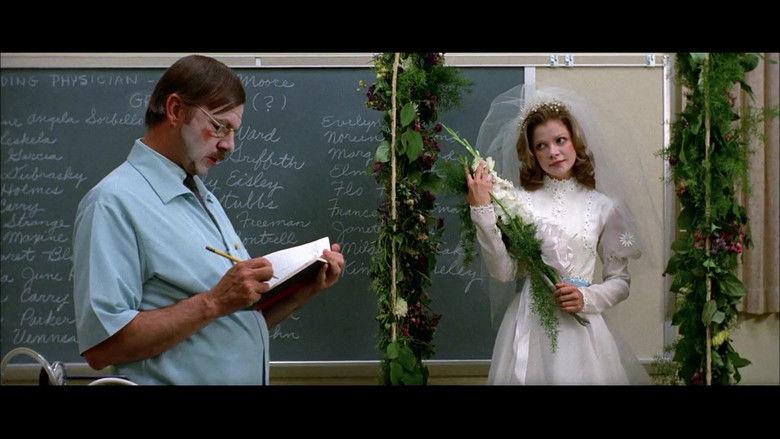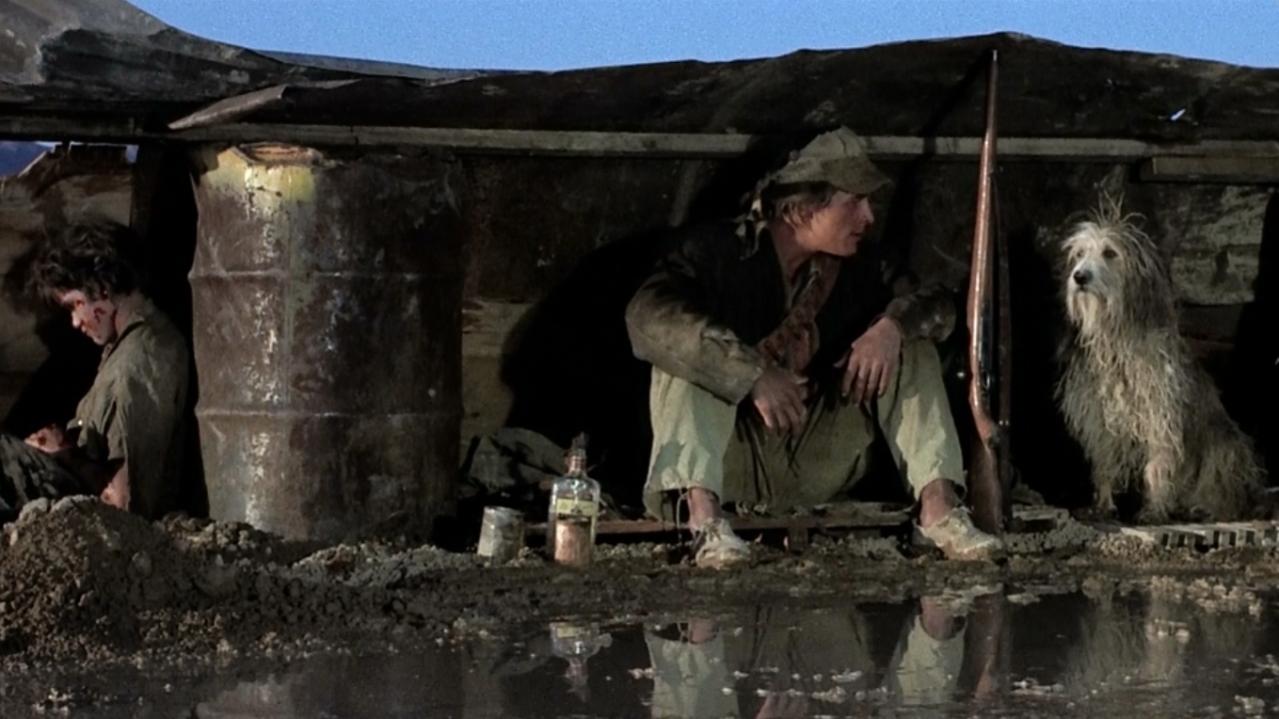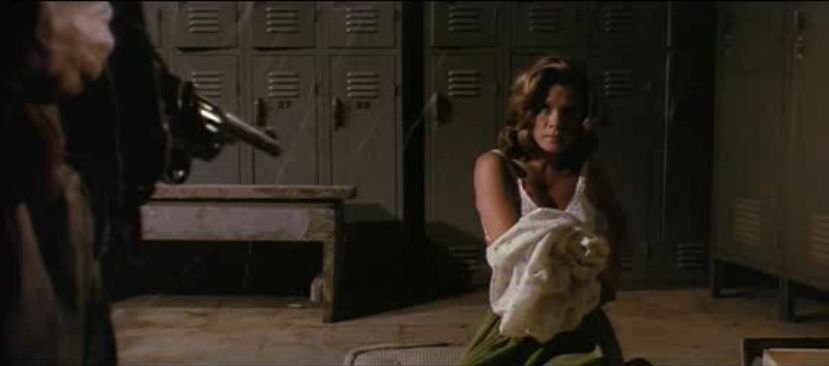← Back to Reviews

in

A Boy and His Dog
Directed by L.Q. Jones
Screenplay by Alvy Moore,
Wayne Cruseturner, and L.Q. Jones
Based on the novella by Harlan Ellison
Cinematography by John Arthur Morrill
CAST: Don Johnson, Tim McIntire, Susanne Benton,
Alvy Moore, Helene Winston, Charles McGraw, Tiger,
and Jason Robards
1975, approximately 91 minutes
A Boy and His Dog is an intentionally deceptive title that, with no other context, could easily conjure up images of a live-action Disney movie, either of a Jack London-type tale of surival in nature or perhaps a wacky comedy about a pooch that runs for mayor? This film is about survival, though about as far from a Disney movie as one can get. An accurate, literal title would be something more like A Teenager and His Telepathic Dog Battle Desperate Souls and Mutants for Food and Water in a Post-Apocalyptic Landscape. Tough to fit that on a marquee.

Years after an atomic war has destroyed most of civilization and humanity, in a radioactive desert somewhere in what was the United States, Vic (Don Johnson, a decade before "Miami Vice" would make him a star) and a dog named Blood (played by Tiger, a Bearded Collie) roam the desolate area looking for supplies and food, trying to avoid danger, most of which consists of the other survivors. Blood is the brains of the outfit, smart and thoughtful, and communicates with Vic via telepathy (voiced by Tim McIntire). Blood also has other useful abilities, including an enhanced sense of smell and a radar-like ability to scan for other living things. The film never explains how Blood and some other dogs have gained this telepathic ability, and it hardly matters. But for all of Blood's advances, he can't pull the trigger on a gun or turn a doorknob, so he and Vic are partners. Vic is supposed to be seventeen or so, and is not terribly bright. An orphan who has survived in the post-apocalyptic landscape for years, he can be impulsive, and at times treats Blood's advice the way a petulant teenager would advice from his father. Much to Blood's frustration. Like many teenagers, Vic is also a little sex-crazed, and in addition to food and bullets, Blood also helps him find women to be with.
The first half of the film has what are, by now, familiar scenarios of fending off groups of bandits looking to take what they want from everybody else. This film was released four years before the original Mad Max, so if it seems less elaborate than something like The Road Warrior, less dystopian than Escape from New York, and less stylized than The Book of Eli or Six-String Samurai or any dozen other movies of the sub-genre in the subsequent decades, remember that this is one of the first.

The narrative switches gears and locales in the second half, and gets even more surreal, when Vic is lured beneath the surface by a beautiful young woman named Quilla June (Susanne Benton). He first saves from a gang and then is quickly and easily seduced by her. Post-coitus, she tells him of a better place than the murderous desert, a place where she lives. A place called Topeka.
Buried deep below the ground, clearly made before the bombs started to fall, is en entire society of survivors. Their beloved Topeka is made in the fashion of Smalltown U.S.A. circa 1940-something, a funhouse mirror take on Norman Rockwell Americana. It's all gingham and denim, picnics and a marching band. Because the light is artificial and they have been underground for years at this point, all of the residents wear thick, white makeup, a Kabuki pagent resulting in the people looking like grotesque, life-sized dolls. Topeka is controlled by a three-member committee, the clear leader of which is Lou Craddock (Jason Robards). They seem to have enough food, resources, electricity and space down there to last for a generation or two, if necessary. And the next generation is exactly why Vic has been brought there. Much like the mineshaft scenario described by Doctor Strangelove at the end of Kubrick's film, there is a need for prodigious procreation! But poor Vic finds out it's not quite the Penthouse Letters orgy he may have imagined.

"Lack of respect, wrong attitude, failure to obey authority. The Farm, immediately."
A Boy & His Dog is insane, twisted, satirical and it, too, was probably ahead of its time. On their face, the action and T&A elements might have made it likely fodder for a Drive-In potboiler, but it's done with a level of wit and insanity that likely would have confused if not outright bored an audience looking for an A.I.P. style flick. And at the same time, too sleazy and nutty for the Art House circuit.
The film's director, L.Q. Jones, is a well-known character actor who had been in the business for two decades, at that point, having been in dozens of television shows and, most fruitfully, part of Sam Pekinpah's stable of actors, starting with Ride the High Country (1962) and following in Major Dundee (1965), The Wild Bunch (1969), The Ballad of Cable Hogue (1970), and Pat Garrett & Billy the Kid (1973). He directed only one other movie before this, a micro-budgeted Western The Devil's Bedroom (1964), and never made another movie after A Boy & His Dog. But this one is a terrific film that has attained cult status, but too often gets left out of the discussion of Best Science Fiction films.


A Boy and His Dog
Directed by L.Q. Jones
Screenplay by Alvy Moore,
Wayne Cruseturner, and L.Q. Jones
Based on the novella by Harlan Ellison
Cinematography by John Arthur Morrill
CAST: Don Johnson, Tim McIntire, Susanne Benton,
Alvy Moore, Helene Winston, Charles McGraw, Tiger,
and Jason Robards
1975, approximately 91 minutes
A Boy and His Dog is an intentionally deceptive title that, with no other context, could easily conjure up images of a live-action Disney movie, either of a Jack London-type tale of surival in nature or perhaps a wacky comedy about a pooch that runs for mayor? This film is about survival, though about as far from a Disney movie as one can get. An accurate, literal title would be something more like A Teenager and His Telepathic Dog Battle Desperate Souls and Mutants for Food and Water in a Post-Apocalyptic Landscape. Tough to fit that on a marquee.
Years after an atomic war has destroyed most of civilization and humanity, in a radioactive desert somewhere in what was the United States, Vic (Don Johnson, a decade before "Miami Vice" would make him a star) and a dog named Blood (played by Tiger, a Bearded Collie) roam the desolate area looking for supplies and food, trying to avoid danger, most of which consists of the other survivors. Blood is the brains of the outfit, smart and thoughtful, and communicates with Vic via telepathy (voiced by Tim McIntire). Blood also has other useful abilities, including an enhanced sense of smell and a radar-like ability to scan for other living things. The film never explains how Blood and some other dogs have gained this telepathic ability, and it hardly matters. But for all of Blood's advances, he can't pull the trigger on a gun or turn a doorknob, so he and Vic are partners. Vic is supposed to be seventeen or so, and is not terribly bright. An orphan who has survived in the post-apocalyptic landscape for years, he can be impulsive, and at times treats Blood's advice the way a petulant teenager would advice from his father. Much to Blood's frustration. Like many teenagers, Vic is also a little sex-crazed, and in addition to food and bullets, Blood also helps him find women to be with.
The first half of the film has what are, by now, familiar scenarios of fending off groups of bandits looking to take what they want from everybody else. This film was released four years before the original Mad Max, so if it seems less elaborate than something like The Road Warrior, less dystopian than Escape from New York, and less stylized than The Book of Eli or Six-String Samurai or any dozen other movies of the sub-genre in the subsequent decades, remember that this is one of the first.
The narrative switches gears and locales in the second half, and gets even more surreal, when Vic is lured beneath the surface by a beautiful young woman named Quilla June (Susanne Benton). He first saves from a gang and then is quickly and easily seduced by her. Post-coitus, she tells him of a better place than the murderous desert, a place where she lives. A place called Topeka.
Buried deep below the ground, clearly made before the bombs started to fall, is en entire society of survivors. Their beloved Topeka is made in the fashion of Smalltown U.S.A. circa 1940-something, a funhouse mirror take on Norman Rockwell Americana. It's all gingham and denim, picnics and a marching band. Because the light is artificial and they have been underground for years at this point, all of the residents wear thick, white makeup, a Kabuki pagent resulting in the people looking like grotesque, life-sized dolls. Topeka is controlled by a three-member committee, the clear leader of which is Lou Craddock (Jason Robards). They seem to have enough food, resources, electricity and space down there to last for a generation or two, if necessary. And the next generation is exactly why Vic has been brought there. Much like the mineshaft scenario described by Doctor Strangelove at the end of Kubrick's film, there is a need for prodigious procreation! But poor Vic finds out it's not quite the Penthouse Letters orgy he may have imagined.
"Lack of respect, wrong attitude, failure to obey authority. The Farm, immediately."
A Boy & His Dog is insane, twisted, satirical and it, too, was probably ahead of its time. On their face, the action and T&A elements might have made it likely fodder for a Drive-In potboiler, but it's done with a level of wit and insanity that likely would have confused if not outright bored an audience looking for an A.I.P. style flick. And at the same time, too sleazy and nutty for the Art House circuit.
The film's director, L.Q. Jones, is a well-known character actor who had been in the business for two decades, at that point, having been in dozens of television shows and, most fruitfully, part of Sam Pekinpah's stable of actors, starting with Ride the High Country (1962) and following in Major Dundee (1965), The Wild Bunch (1969), The Ballad of Cable Hogue (1970), and Pat Garrett & Billy the Kid (1973). He directed only one other movie before this, a micro-budgeted Western The Devil's Bedroom (1964), and never made another movie after A Boy & His Dog. But this one is a terrific film that has attained cult status, but too often gets left out of the discussion of Best Science Fiction films.
